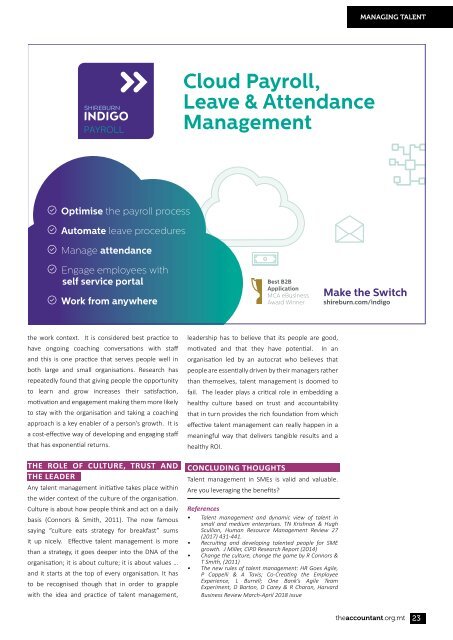ACCSPRING18_ONLINEVER
Create successful ePaper yourself
Turn your PDF publications into a flip-book with our unique Google optimized e-Paper software.
MANAGING TALENT<br />
Cloud Payroll,<br />
Leave & Attendance<br />
Management<br />
Optimise the payroll process<br />
Automate leave procedures<br />
Manage attendance<br />
Engage employees with<br />
self service portal<br />
Work from anywhere<br />
Best B2B<br />
Application<br />
MCA eBusiness<br />
Award Winner<br />
Make the Switch<br />
shireburn.com/indigo<br />
the work context. It is considered best practice to<br />
have ongoing coaching conversations with staff<br />
and this is one practice that serves people well in<br />
both large and small organisations. Research has<br />
repeatedly found that giving people the opportunity<br />
to learn and grow increases their satisfaction,<br />
motivation and engagement making them more likely<br />
to stay with the organisation and taking a coaching<br />
approach is a key enabler of a person’s growth. It is<br />
a cost-effective way of developing and engaging staff<br />
that has exponential returns.<br />
THE ROLE OF CULTURE, TRUST AND<br />
THE LEADER<br />
Any talent management initiative takes place within<br />
the wider context of the culture of the organisation.<br />
Culture is about how people think and act on a daily<br />
basis (Connors & Smith, 2011). The now famous<br />
saying “culture eats strategy for breakfast” sums<br />
it up nicely. Effective talent management is more<br />
than a strategy, it goes deeper into the DNA of the<br />
organisation; it is about culture; it is about values …<br />
and it starts at the top of every organisation. It has<br />
to be recognised though that in order to grapple<br />
with the idea and practice of talent management,<br />
leadership has to believe that its people are good,<br />
motivated and that they have potential. In an<br />
organisation led by an autocrat who believes that<br />
people are essentially driven by their managers rather<br />
than themselves, talent management is doomed to<br />
fail. The leader plays a critical role in embedding a<br />
healthy culture based on trust and accountability<br />
that in turn provides the rich foundation from which<br />
effective talent management can really happen in a<br />
meaningful way that delivers tangible results and a<br />
healthy ROI.<br />
CONCLUDING THOUGHTS<br />
Talent management in SMEs is valid and valuable.<br />
Are you leveraging the benefits?<br />
References<br />
• Talent management and dynamic view of talent in<br />
small and medium enterprises. TN Krishnan & Hugh<br />
Scullion, Human Resource Management Review 27<br />
(2017) 431-441.<br />
• Recruiting and developing talented people for SME<br />
growth. J Miller, CIPD Research Report (2014)<br />
• Change the culture, change the game by R Connors &<br />
T Smith, (2011)<br />
• The new rules of talent management: HR Goes Agile,<br />
P Cappelli & A Tavis; Co-Creating the Employee<br />
Experience, L Burrell; One Bank’s Agile Team<br />
Experiment, D Barton, D Carey & R Charan, Harvard<br />
Business Review March-April 2018 issue<br />
theaccountant.org.mt<br />
23

















